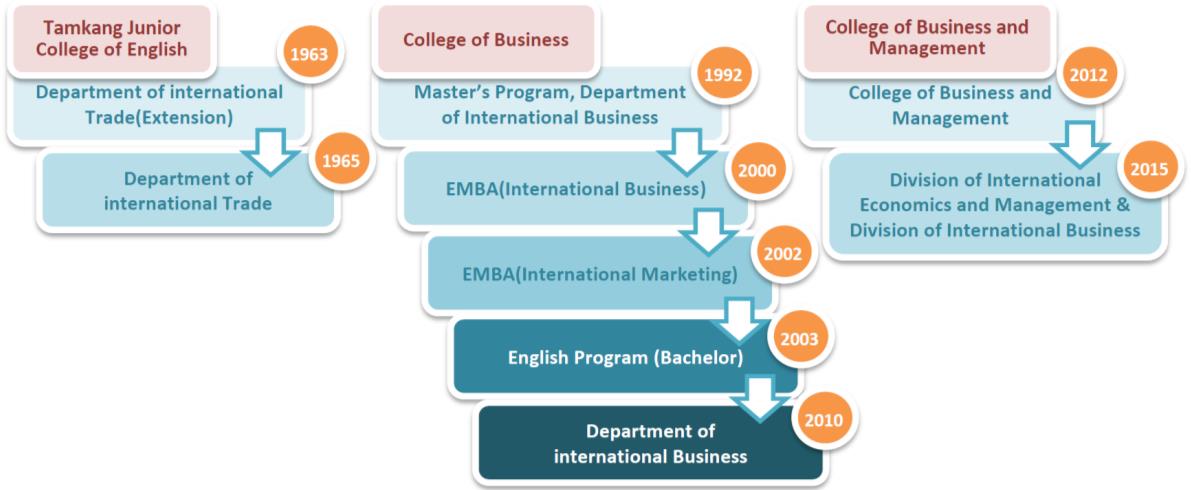
The Department of International Trade was established in 1963 in order to adapt to the nation’s economic development and cultivate students with specialized knowledge in commercial affairs in general and in international commercial affairs in particular. In the early stage, classes were only taught in the evenings. In 1965 the Department was reorganized and started to offer classes in both day and evening divisions, with each division enrolling two classes of students per year. In 1982, the Department was expanded to enroll three classes for both the day and evening divisions. Courses offered at that time were mainly concerned with theories, policies, and practices that are related to economics, marketing, finance, and foreign trade.
In the 1990s because of the economic changes home and abroad, domestic enterprises were becoming more and more globally concerned and were seeking foreign subsidiaries and branches. To cope with the need of the time, the Department began to add courses related to international business management and international investment to its undergraduate curriculum.
The graduate program on international business was set up in 1992 which offers the degree of Master of Business Administration (MBA). The MBA program, aimed at training middle to high ranking managers for multinational enterprises, provides education and research facilities that are intensive and specialized in the following four areas: international business management, international marketing, international financial management and planning, and international investment decision making. These and other relevant courses are designed to match the current trend of the nation’s economic development toward internationalization and liberalization.
In the academic year 1997 the graduate program was divided into two subprograms, namely, the International Business Program, and the International Economics, Investment, and Trade Law Program. In the same academic year the undergraduate program went through a drastic change by stopping enrolling students for the evening division, and as a result, the program enrolled four classes of regular students.
In the academic year 2000 the undergraduate program set up its extensional education program by enrolling one class of high-school graduates who have left school for at least one year, and thus the four classes of regular students were reduced to the present three.
Moreover, in the meantime the graduate program began to enroll a class of college graduates who have been on their jobs for more than three years.
In the academic years 2002 with an aim to carry out the Ministry of Education’s policy of lifelong study in higher education system, the Department set up a new graduate program offering the degree of Executive Master of Business Administration in International Commercial Sciences(IMBA). The IMBA program, focused on training high-ranking managers for multinational enterprises, provides education and research facilities that are specialized in international marketing, international financial management, international insurance, and international economics. Required courses are lectured mainly in English, while optional ones are taken abroad in an intensive course fashion. With the joint effort of the high-ranking managers and the faculty of the college of business, this program works hard to make business decisions, grasp current multinational investment environment, explore and solve problems related to multinational business.
In the academic year 2003 with an aim to push forward the internationalization policy of the university and highlight the special features of its development, the Department redesigned its undergraduate program and came up with a brand new program-the Undergraduate English Instruction Program. The curriculum was redesigned to adapt to the one-year study of Junior Abroad program. All the courses of the program are instructed in English except for those general courses. The major courses of the first two years of study focus on the fundamental theories related to international business. The Junior Abroad program emphasizes its study on scopes of international marketing, international business management, international financial management, and international economics. The fourth year curriculum highlights the features of the development of the Department in the nation.
The Department renamed as Department of International Business in 2010. In the academic year 2014 with an aim to emphasis the development of globalization and to position two different existing programs with harmony, the department restructures its curriculum with one division of international economics and management which emphasizes traditional International Business contents and with another division of English-taught global commerce which concentrates on global commerce activities and puts into considerations of the international difference and reconciles all global resources with harmony. The department set sails to cultivate qualitative international business and global commerce elites. Every graduate from our department can play a key role in every professional area and can become the social ascendancy of energy of society.
